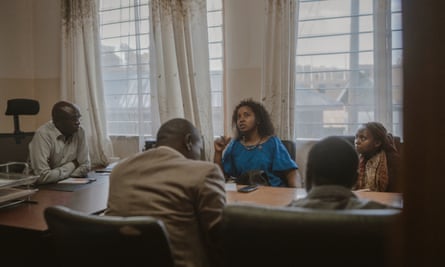She leads a team of 100 at a non-profit with operations across Africa and says climate has been seen through a male perspective for too long
Susan Chomba glares out the window of the Prado Land Cruiser at dozens of motorcycles speeding in the opposite direction. Each motorcycle carries at least five bags of charcoal and for every bag, at least three medium-sized acacia trees must be chopped down and burned. Charcoal production is banned in Kenya, but is still widely used for domestic heat and cooking.
Chomba loves trees. She can rattle off the scientific and local names of countless species and detail their ideal growing conditions. She holds a PhD in forest governance and master’s degrees in agriculture development and agroforestry. She is director of food, land and water programs, continent-wide, at the World Resources Institute (WRI), a global environmental research non-profit. She manages a portfolio of $20m and a staff of 100.
She is a rarity.
Roughly 12% of the world’s top climate scientists are women and fewer than one percent are from Africa – a continent hard hit by climate change. “If you look at the way the world operates, it’s almost blind to the fact that women bear the biggest burden and brunt of climate change,” Chomba says. That Chomba is an African woman in such a key role is potentially revolutionary, especially because she goes out of her way to solicit the views of those most affected and often most unheard – local farmers, community elders and, notably, women.
“The way climate is seen in the world, it’s seen very much from a masculine perspective,” Chomba says. For example, while male climate scientists focus heavily on developing renewable sources of energy to replace fossil fuels like oil and gas, Chomba believes they pay far less attention to the hundreds of millions of women worldwide who are burning wood for tasks like cooking. Incorporating the perspectives of women – particularly poor, rural women – would better ensure comprehensive solutions, she says.

Chomba is 40 years old but still remembers the hunger pangs she suffered as a child when the land failed to yield enough food for her family. More people, most likely women and children, will suffer the same fate, or worse, if wise and profound changes aren’t made soon.
Today, she is traveling with a team of WRI experts from Nairobi to Baringo county in Kenya’s Great Rift Valley, home to mountainous forests that supply 75% of Kenya’s water. But the expansion of agriculture into previously natural environments, deforestation for charcoal and logging, urbanization and climate change have ravaged the land, leaving it thirsty and bare. Locals say they haven’t had a yield of maize or beans, their staple crops, in three years.
Chomba and her team visit a giant gully that has split the ground into two in the middle of the farmland. The area has been overharvested and overgrazed, with few natural grasses or indigenous trees left to hold the soil together. That, combined with climate change and an intense dry season, has left the earth looking like parched, cracked skin.
An elderly farmer points to a tree and says cooking oil can be extracted from the native species.
read more at: theguardian.com
photo: theguardian.com, Fredrik Lerneryd/The Fuller Project


Leave a Reply